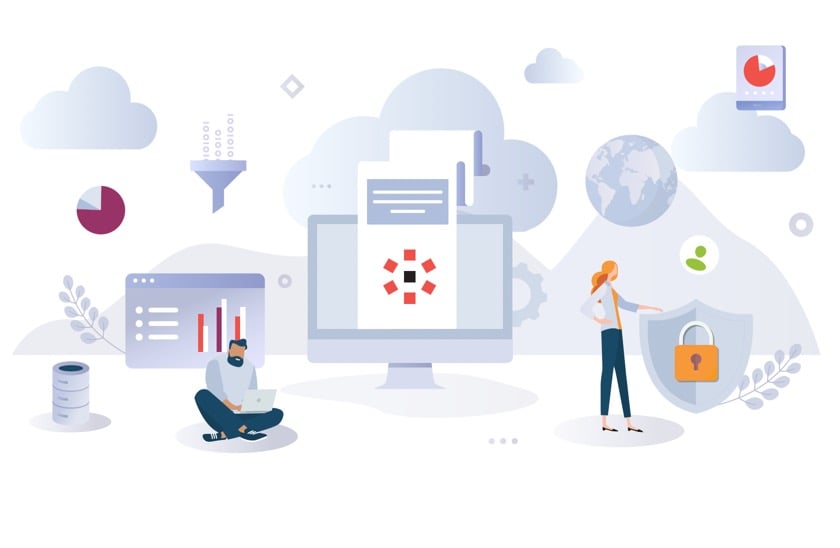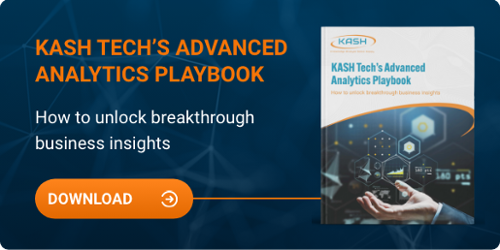Contents
Introduction
Cloud computing technology is growing more quickly than ever before. Applications are becoming more portable, enabling compute cycles to support workloads in real time, and data integration platforms are streamlining connectivity and crossing platform boundaries, making hybrid and multi-cloud architecture the de-facto standard.
In 2019, Denodo released its second cloud survey, and that momentum continues with the Denodo Global Cloud Survey 2020.
Download a Personal
Copy of this Survey
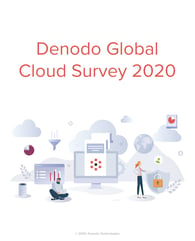
Fill out the form to receive
your copy of the eBook.
Download the Survey
The results of this survey highlight some unique capabilities tied to workload automation that further simplify the adoption of hybrid and multi-cloud technologies. As workloads span clouds, the cloud providers themselves routinely extend into rival territory, and this is clearly evident from technology advancements such as Google Anthos, Amazon Outposts, and Azure Stack. The advantages of hybrid cloud configurations include the ability to diversify spend and skills, build resiliency, and cherry-pick features and capabilities depending on each vendor's particular strengths, all while avoiding the dreaded vendor lock-in.
In another trend, organizations are leveraging container orchestration as fabric that enables them to extend applications across disparate cloud infrastructures, delivering on the multi-cloud promise. Enterprises are finding that Kubernetes solutions best meet their unique operational needs and capabilities, such as those offered by RedHat OpenShift and Docker or native provider services like Google Kubernetes Engine (GKE), Microsoft AKS (Azure Kubernetes Service), and AWS EKS (Elastic Kubernetes Service).
Infused intelligence is becoming the norm, with every Software-as-a-Service, IT Ops, analytics, and BI product currently being infused, in various ways and to varying degrees, with machine learning, whether it needs it or not.
Based on various findings, cloud spending should continue to rise, along with cloud marketplaces supported by smarter data management and integration techniques.
1. Cloud Adoption
Cloud adoption is a foundational metric for demonstrating cloud maturity and the readiness to run workloads in the cloud. More than 75% of respondents are running some kind of workload in the cloud, a figure that has risen by over 10% compared to the 2019 survey. At the same time, quite a few respondents are still watching and waiting to take that first leap of faith to the cloud.
Chart 1
How would you rate your cloud adoption?

Chart 2
Cloud adoption 2019 vs 2020
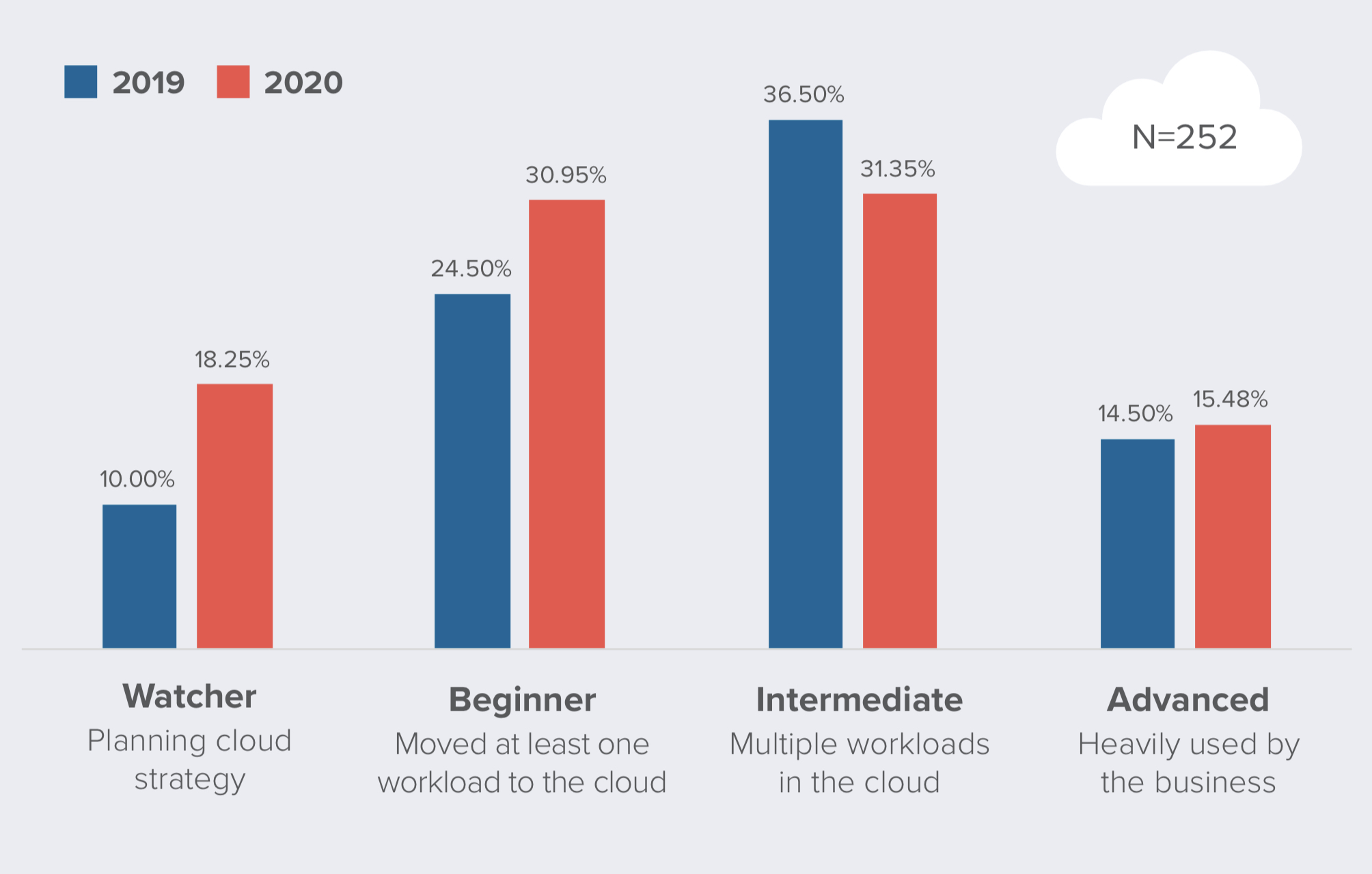
Over the past year, we see a positive reinforcement of cloud adoption with at least a 10% increase across watchers, beginners, and intermediate adopters.
Respondents have realized that adopting cloud technology is not as simple as flipping a switch, and more careful analysis and evaluation might be needed to get started. One has to consider various choices along the lines of the costs and benefits of each cloud platform, as well as the willingness of stakeholders to equally participate in and support the organization’s cloud journey.
Chart 3
What are the key cloud initiatives in your organization?
66%
Analytics and BI reporting are the key cloud initiatives
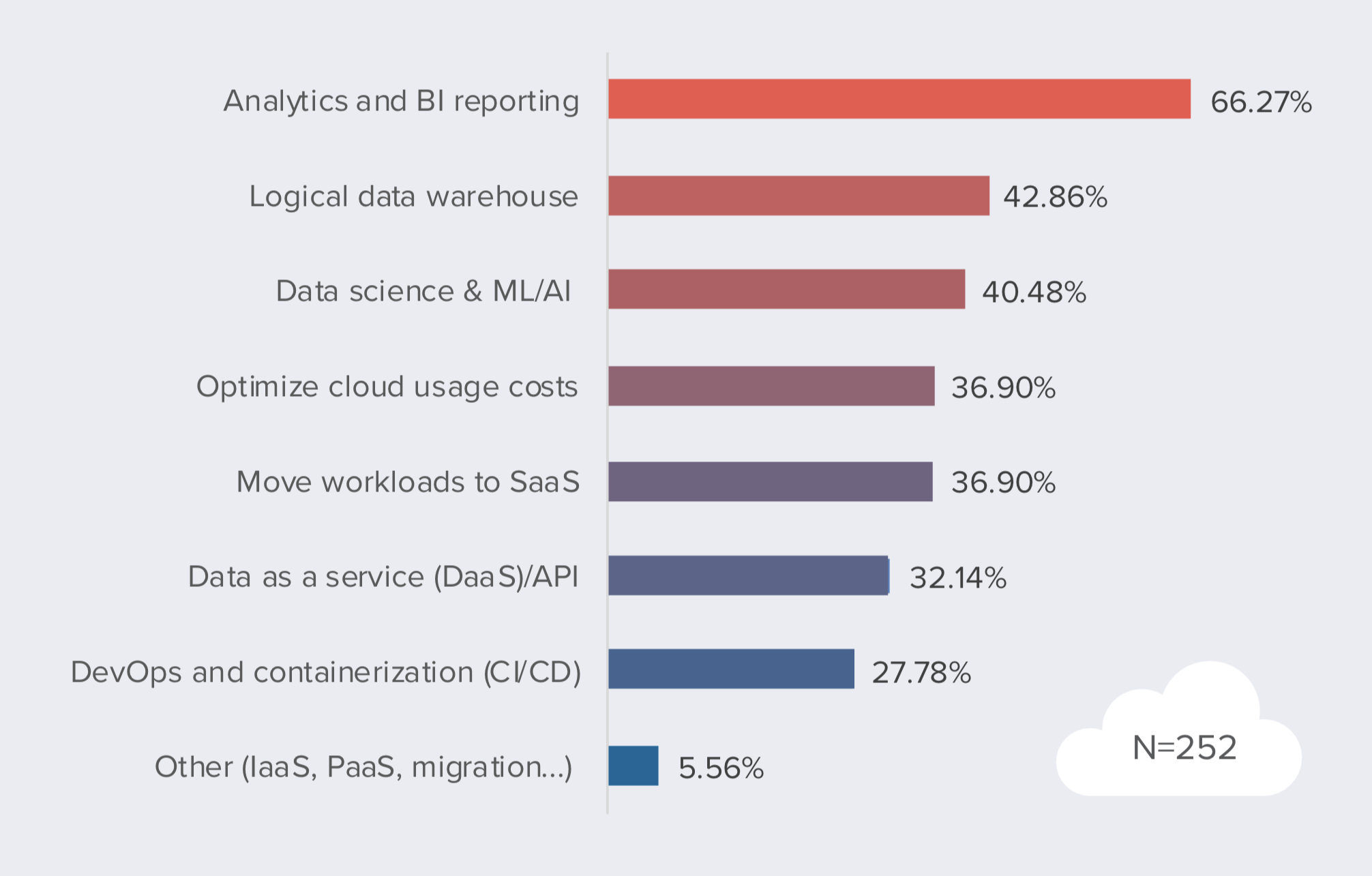
The shift to the cloud has enabled several solutions that simplify the overall business, driven by cost savings, added flexibility, and implementing cloud workflows to stay competitive. As companies grow and gather more data, SaaS technology will be at the center of data management, along with marketing automation tools, customer relationship management (CRM) systems, and other enhancements that have helped lines of businesses to do their jobs more efficiently.
Analytics and BI leads the pack of key cloud initiatives with a whopping 66% of respondents driving big data analytics projects, closely followed by data science and logical data warehousing in the cloud. Close to 40% of respondents see cloud cost optimization as fundamental to establishing cloud deployment value, which includes rightsizing instances to scale and eliminating underused resources.
2. Cloud Challenges and Deployment Strategy
Cloud platforms each have their own advantages, and the right cloud deployment strategy can meld those separate benefits into a unified platform. Putting your data and apps into the right cloud configuration will make the difference, not only in terms of system responsiveness but also ROI.
A number of challenges prevent enterprises from fully embracing cloud technology. From concerns about security, control, and performance, to frustrations surrounding the management of multiple clouds and getting locked into using a specific vendor, there is no shortage of reasons why enterprises should think carefully, and due diligence is always a good step.
With data spread across disparate sources and geographic regions, it is even more important to ensure that data movement and replication is minimized, to save time and cost.
Chart 4
What are the popular data formats in the cloud?
68%
Structured data is the most popular format in the cloud

There are several data formats to choose from when working with applications in the cloud. Each has its own strengths and weaknesses, and understanding the trade-offs will help you choose a format that fits your goals.
While two thirds of the data being put to use is still in a structured format (68%), there is a vast pool of unstructured data that is not yet exercised completely. Cloud object storage (47%) along with SaaS data (44%) are frequently used to maximize ease of computation and performance optimization.
Chart 5
What do you perceive as the top cloud challenges?
65%
perceive security and governance as the top cloud challenge
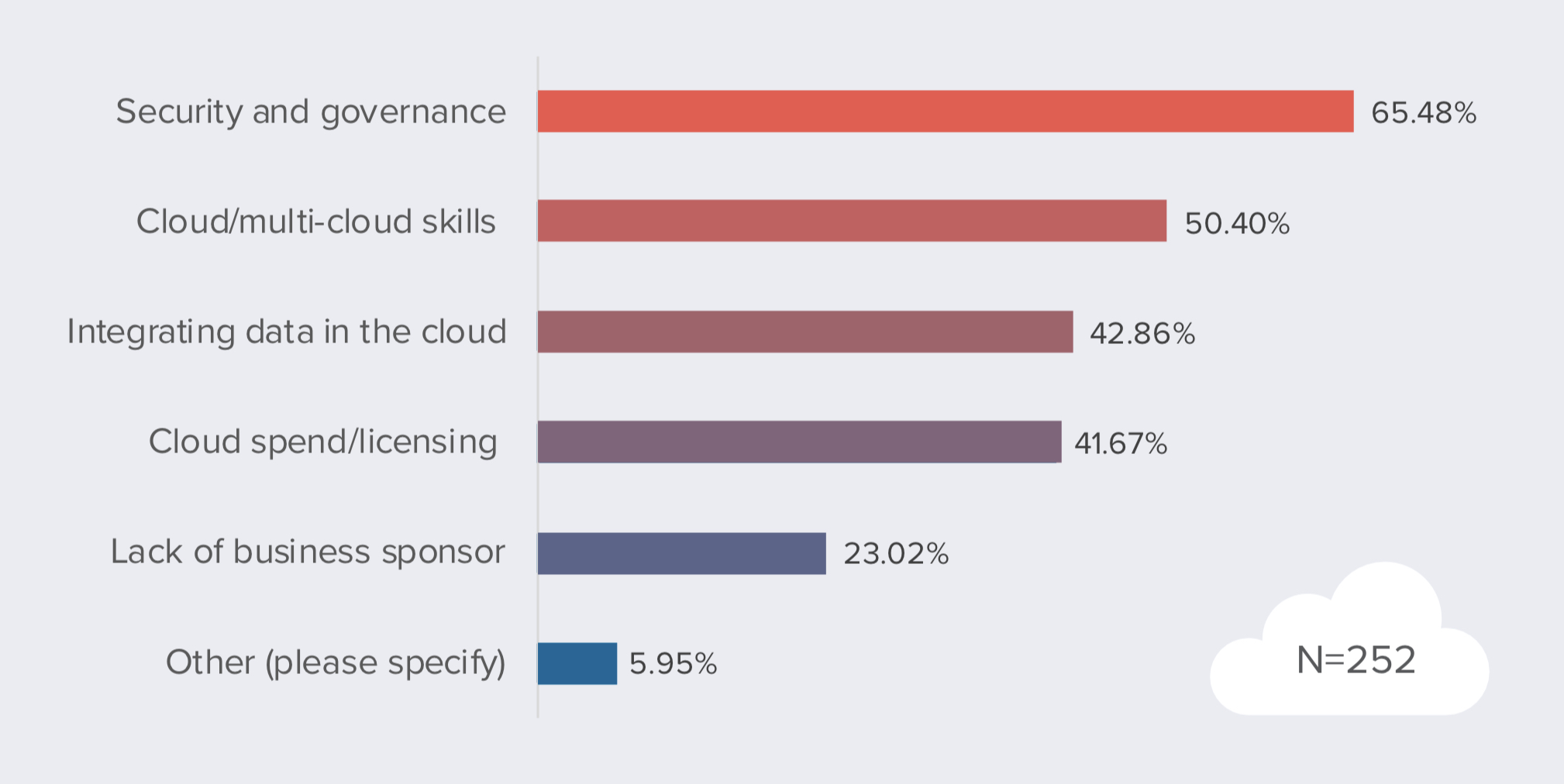
Chart 6
Top Cloud Challenges 2020 vs 2019
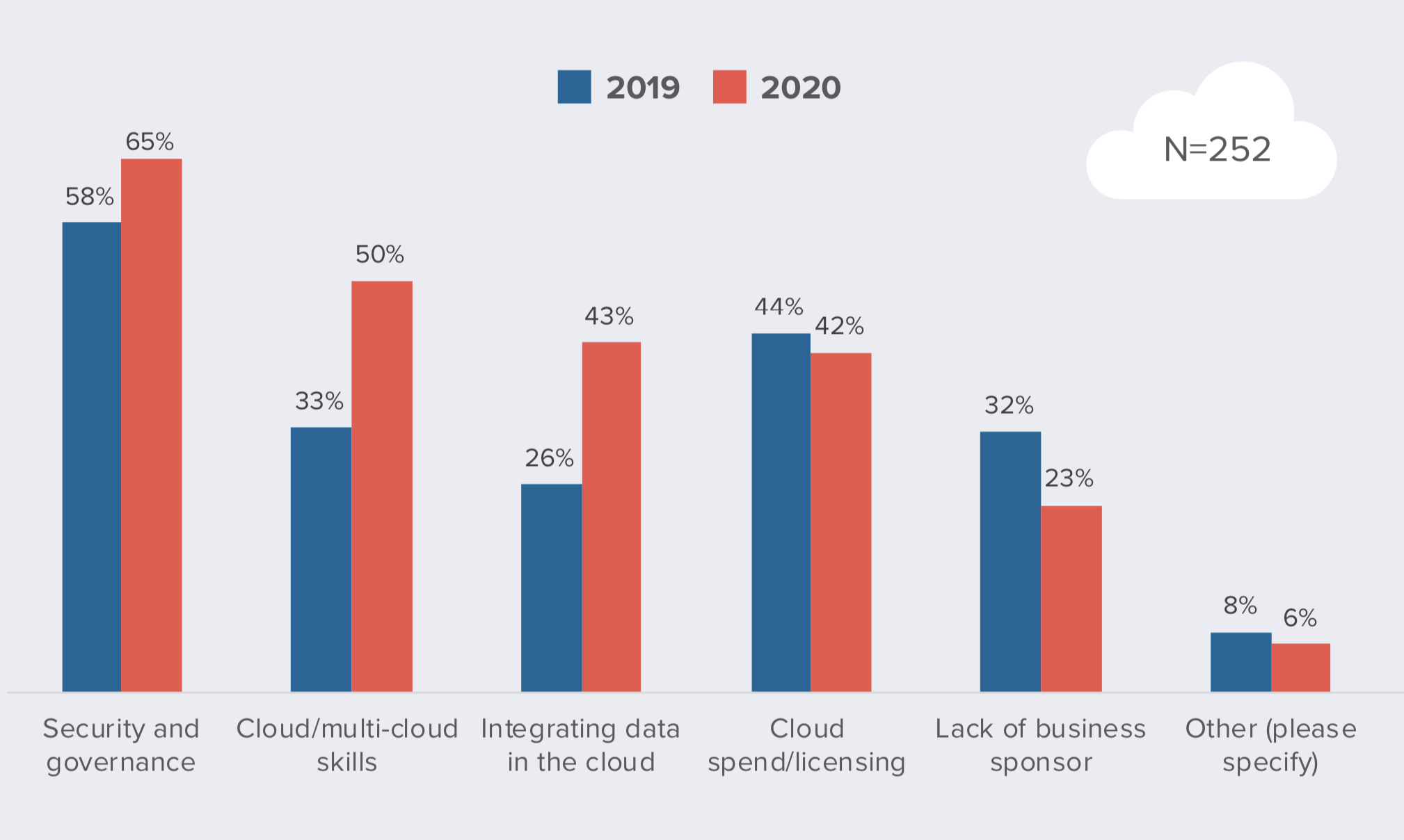
As seen across numerous surveys, organizations still have concerns about cloud computing. While IT leaders are embracing the cloud because of its benefits, they continue to face significant cloud computing challenges, with security and governance again topping the list. This appears to be waning as time passes, particularly among companies that have been using the cloud longer.
Cloud specific skills (50%) and data integration (43%) are close behind security (65%) as the top 3 challenges to be dealt with when it comes to planning and adopting a cloud platform.
Cloud spending (41%) is an equally important concern as users start making assumptions about the potentially huge savings that the cloud has to offer. Cloud vendors are providing users with new tools for monitoring and managing their spend. For example, AWS has quietly released a major enhancement/overhaul to purchasing compute resources up front, and savings plans offer significant savings over on-demand EC2 Reserved Instances, in exchange for a commitment to use a specific amount of compute power (measured in $/hour) for a one- or three-year period.
For the 2020 survey, the challenge of integrating data in the cloud has almost doubled (42%), and users are realizing the significance of cloud integration in a multi-cloud environment.
Chart 7
What cloud deployment strategy are you considering?
42%
leverage a hybrid cloud model
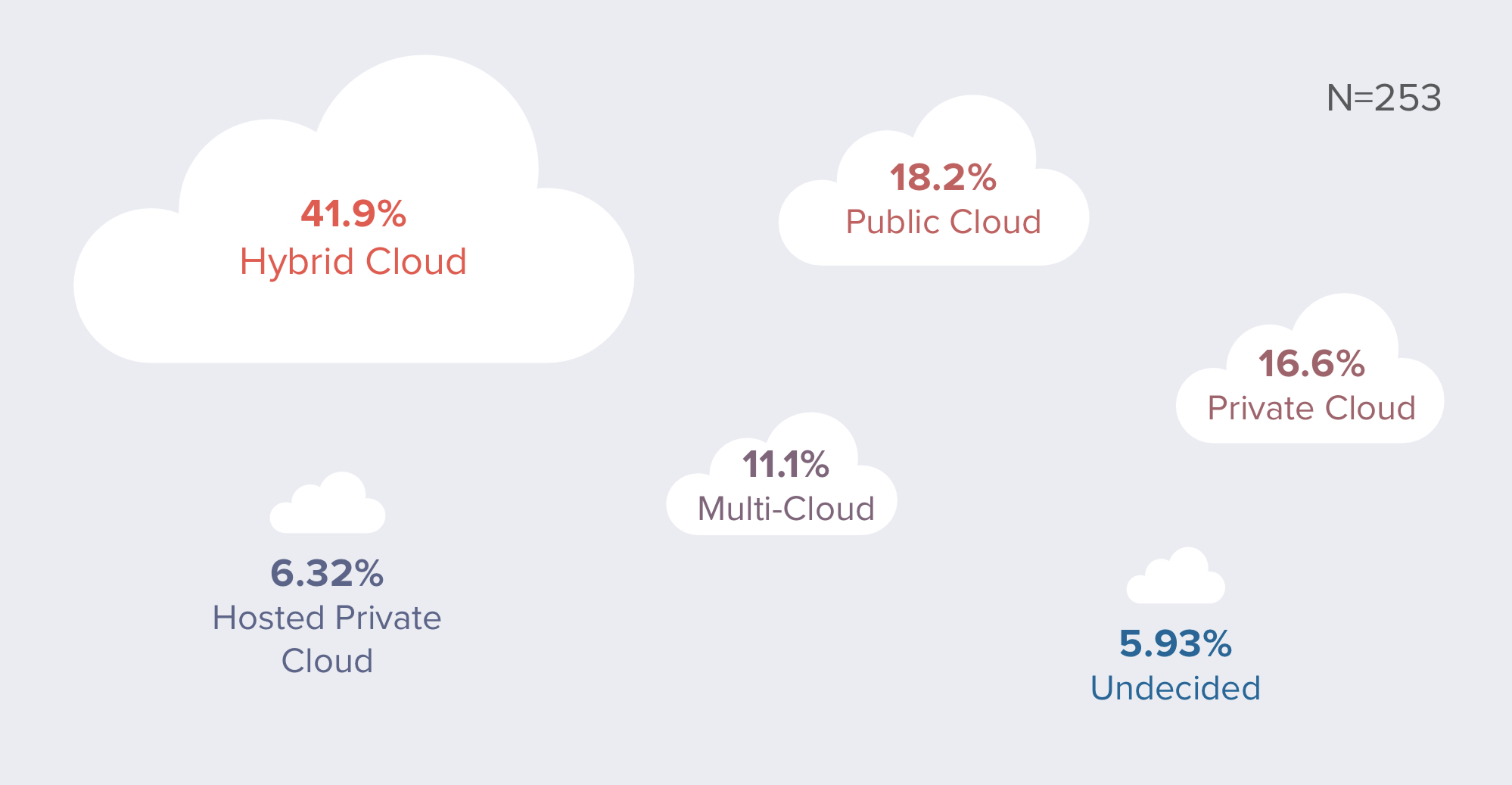
Hybrid cloud configurations are at the center of all cloud deployments, closely followed by public and private clouds. Multi-cloud architecture is certainly being talked about a lot, but it needs to be closely evaluated based on a variety of factors, such as initial and ongoing costs, SLA/provider skills, regional deployment capabilities, and configuration flexibility.
The above numbers are in line with the top three deployment strategies from 2019, which consist of hybrid, public, and private clouds. That does not mean that multi-cloud architecture is not important, as users are blending their workloads to take advantage of capabilities across different cloud providers.
Additionally, security and governance play important roles in how data flows across applications in the cloud, and the proper choice of a data management tool in the cloud becomes even more crucial to success.
3. Cloud Provider/Platform and Cloud Migration
Cloud services have revolutionized computing, enabling businesses to develop virtualized IT infrastructure and deliver software through the cloud, independent of a user's operating system. Choosing the right public cloud provider is equally important, as CIOs are faced with a bewildering option of providers and services.
Chart 8
Who do you consider as your lead cloud provider?
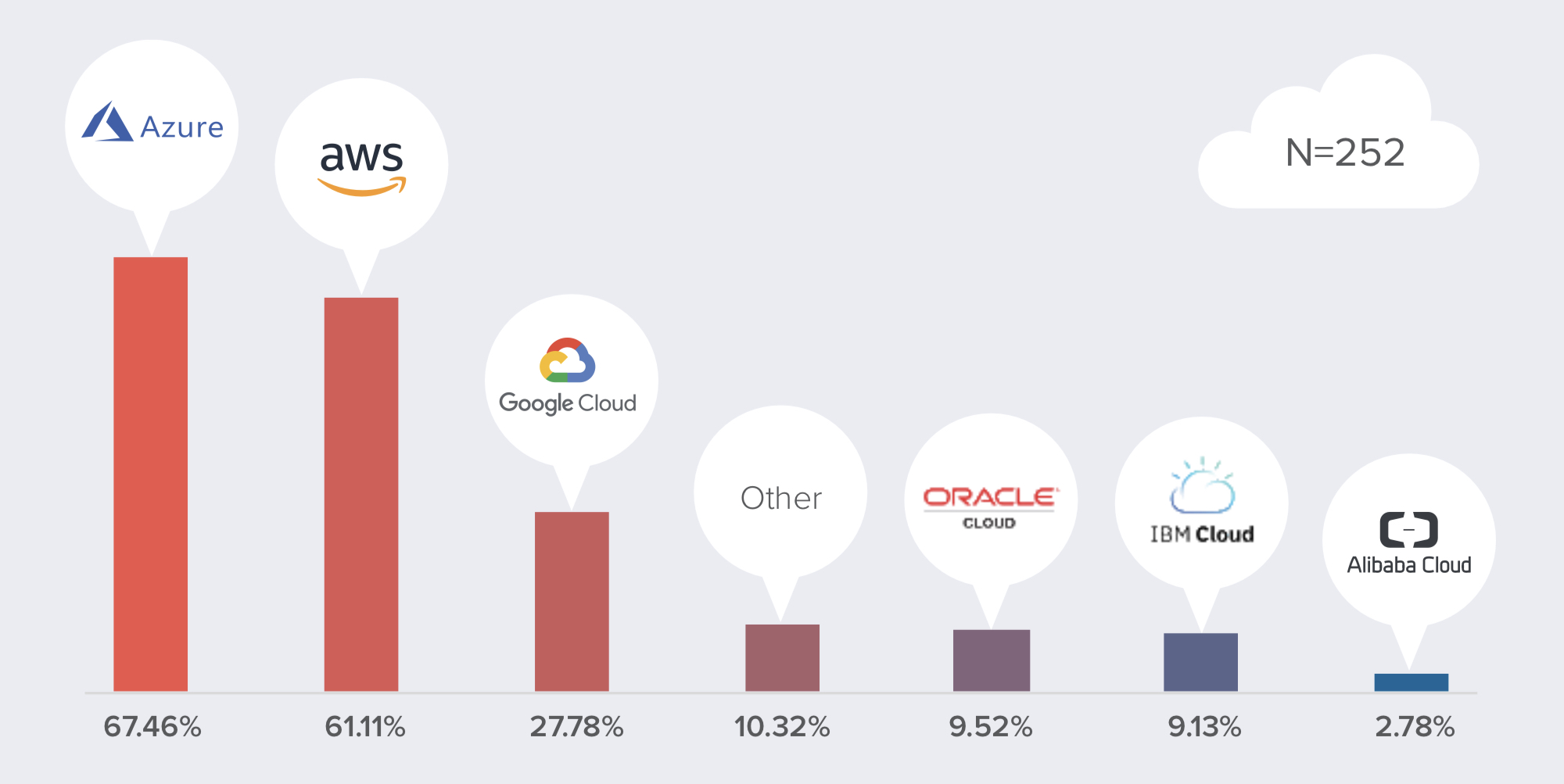
Chart 9
Top Cloud Provider 2020 vs 2019
67%
Microsoft Azure has emerged as the new leader
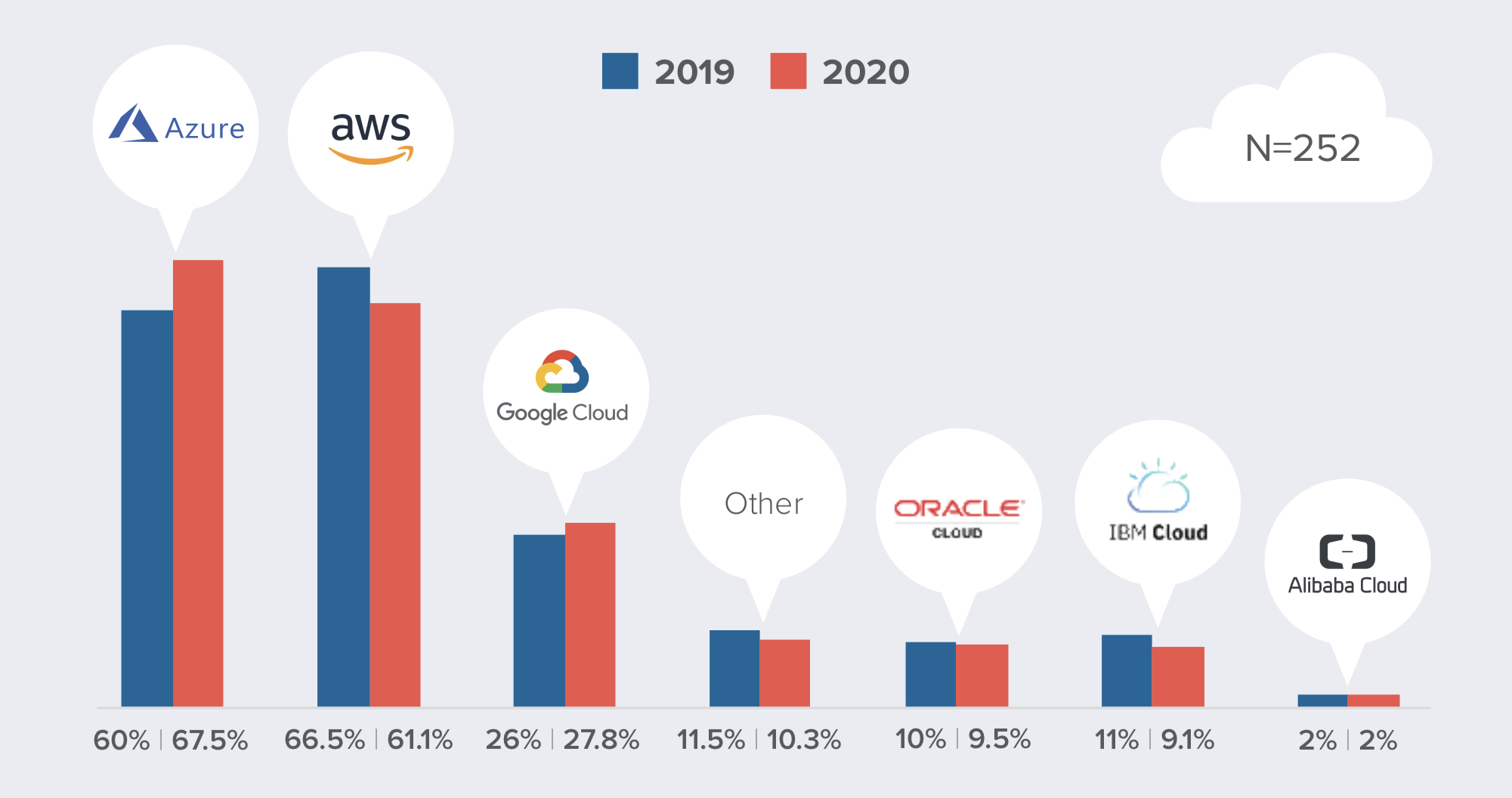
The top cloud providers for 2020 have grown considerably. As a result, Microsoft Azure has emerged as the new leader (67%), although AWS (61%) is not far behind. One could say that they are closely competing, and one might choose one or the other, depending on the specific services that one needs. Azure cloud has penetrated various markets, and at the same time, other cloud providers such as Google, IBM, and Oracle, are taking note.
Google, IBM, and Oracle have quite a bit of catching up to do. While Alibaba might be the platform of choice in the APAC region, it does not have enough votes to bring it into the spotlight.
The interoperability of Oracle Cloud and Microsoft Azure enables both, working in tandem, to support both line-of-business and mission-critical applications. Customers can now migrate to the cloud or build new applications, leveraging the best of Oracle Cloud, including Oracle Autonomous Database, and the best of Microsoft Azure, with seamless interoperability.
Cloud migration is the process of moving data, applications, and related business components to the cloud. However, migration can be disruptive, depending on the type of strategy employed. Data integration plays an important role during cloud migration and should not be sidelined. The general goal or benefit of any cloud migration is to host applications and data in the most effective IT environment possible, based on factors such as cost, performance, and security.
Chart 10
What is the role of IT in your cloud strategy/ transformation?

If you follow the hype, you might think that every enterprise has migrated their applications to the cloud and that your organization is behind the times with its on-premises or co-located data center. The truth is, many cloud computing technologies are a few years’ away from mainstream adoption. Companies consider it daunting to move the majority of their workloads to the cloud, not only because of the migration cost, but also because their IT teams might not be ready to operate in this new world. With the new advancements around Infrastructure as Code, CI/CD, serverless, and containers, concerns over security and compliance can place IT operations teams in a state of flux for years, which threatens uptime and reliability. Of course, migration itself can also be a source for downtime.
Chart 11
What is your cloud migration pattern of choice?
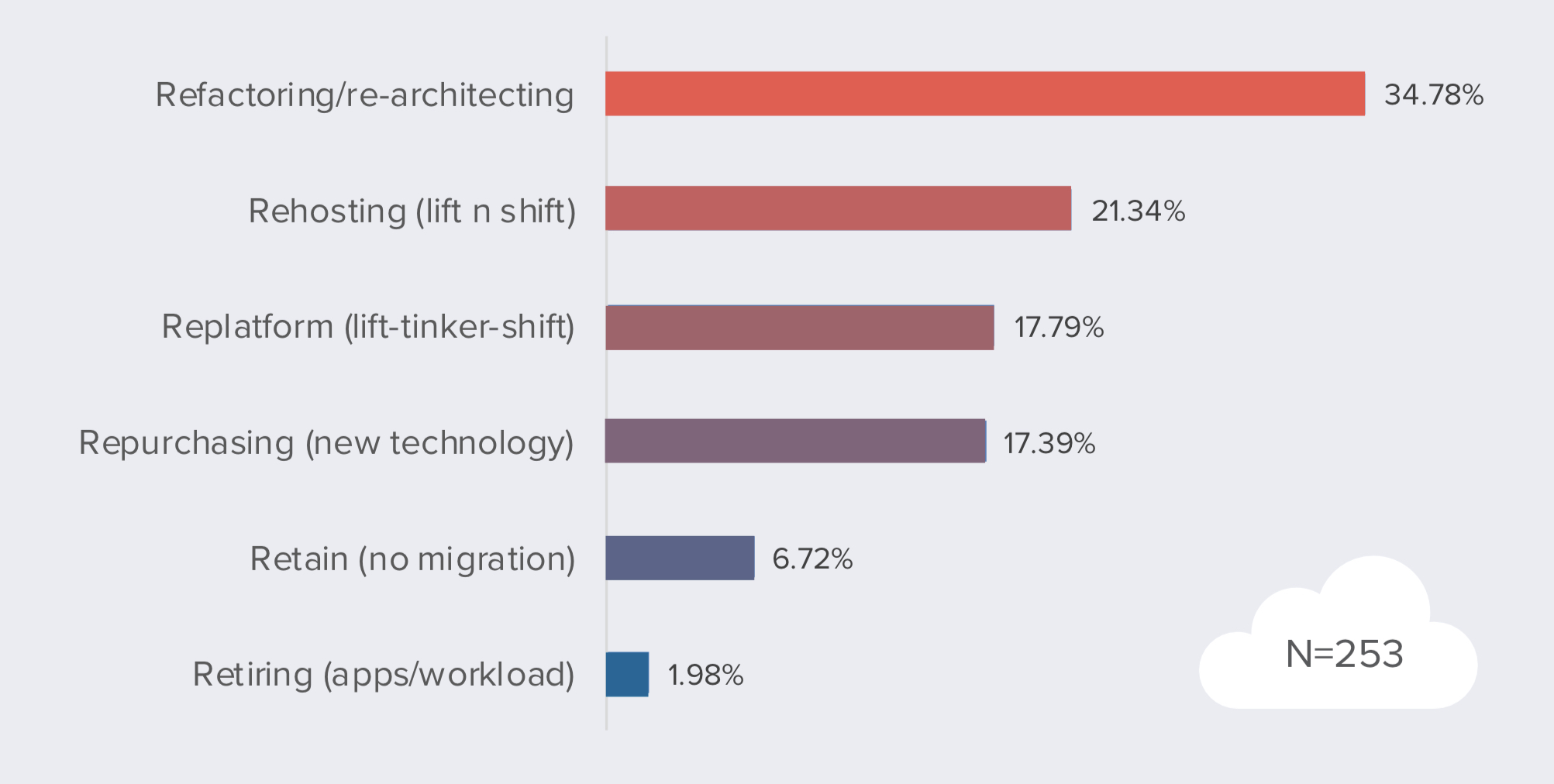
Chart 12
Cloud Migration Pattern, 2020 vs 2019
35%
are looking at re-architecting their applications
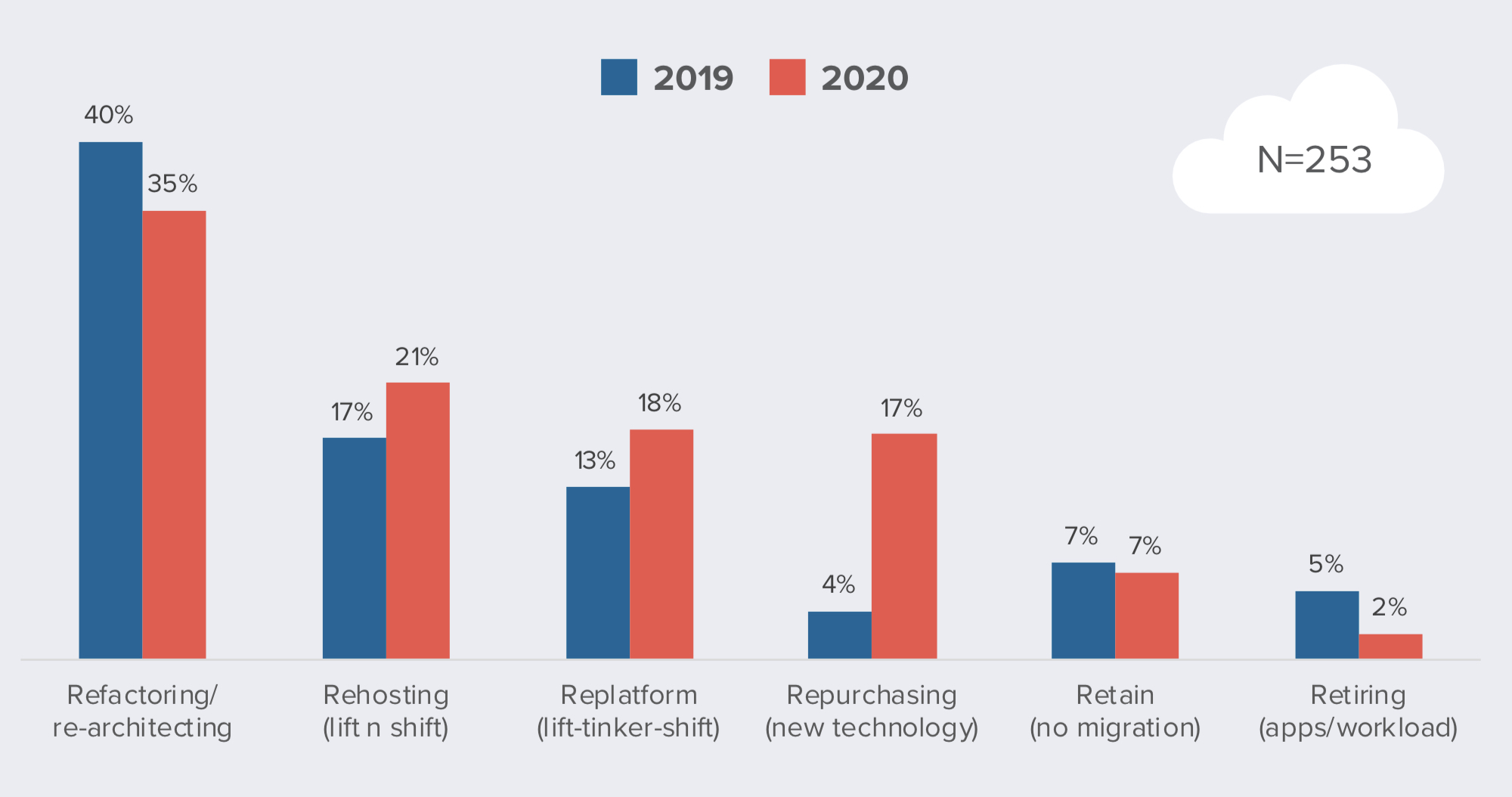
Migrating to a new cloud infrastructure can be both thrilling and challenging. The actual process of migrating to the cloud can be cumbersome and difficult to handle, though it does not always have to be this way. Organizations simply need to plan appropriately for the move and carefully select the best approach. The most common ones are re-architecting, rehosting, and re-platforming.
As you can see from the diagram above, one third (35%) of the respondents are looking at re-architecting their applications, which involves the modernization of the entire data infrastructure. As you can see, 21% selected rehosting, possibly due to SMBs trying to accelerate the migration in a simplified manner, whereas 18% of the respondents are re-platforming, to take advantage of new compute and storage capabilities without making any major changes to the application.
Download a Personal
Copy of the Survey
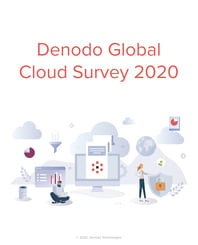
Fill out the form to receive
your copy of the eBook.
Download the Survey
4. Cloud Services/Use Cases across AWS, Azure, and GCP
While building a scalable system is a lot easier with the advent of cloud technologies, identifying the right fit can be challenging. This might take years of solid experience in an architectural space. Cloud services offer a wide range of capabilities that facilitate use cases in the cloud, and the overall architecture plays an important role, which is directly tied to geographical location, security, network infrastructure, and storage, some of the drivers that might define the SLAs and interoperability. Advanced use cases around API-driven services and IoT data management exploit multi-location architecture, which is also influenced by security and governance.
Chart 13
What are the top 3 cloud services in your organization?

Each cloud platform has its own specific strengths, but the top use cases appear to be the same across the board. More than 50% of the respondents are leveraging cloud for advanced analytics, machine learning/AI, data lakes, and infrastructure-as-a-service (IaaS), to save costs while gaining the ability to burst compute/storage across multiple workloads on the fly. Around 20% of the respondents are using cloud technologies for backup and disaster recovery purposes, including migration at a controlled pace.
DevOps is a cultural practice of bringing together development and the operations verticals so that both teams can work collaboratively instead of in siloes. Containerization is a DevOps-friendly approach to production because it enables reproducibility and the ability to automate deployments. All organizations should enhance and integrate their security processes for hassle-free development and the seamless delivery of applications and services.
Chart 14
What container technologies are being used/considered in your cloud architecture?
46%
use Docker as their container technology
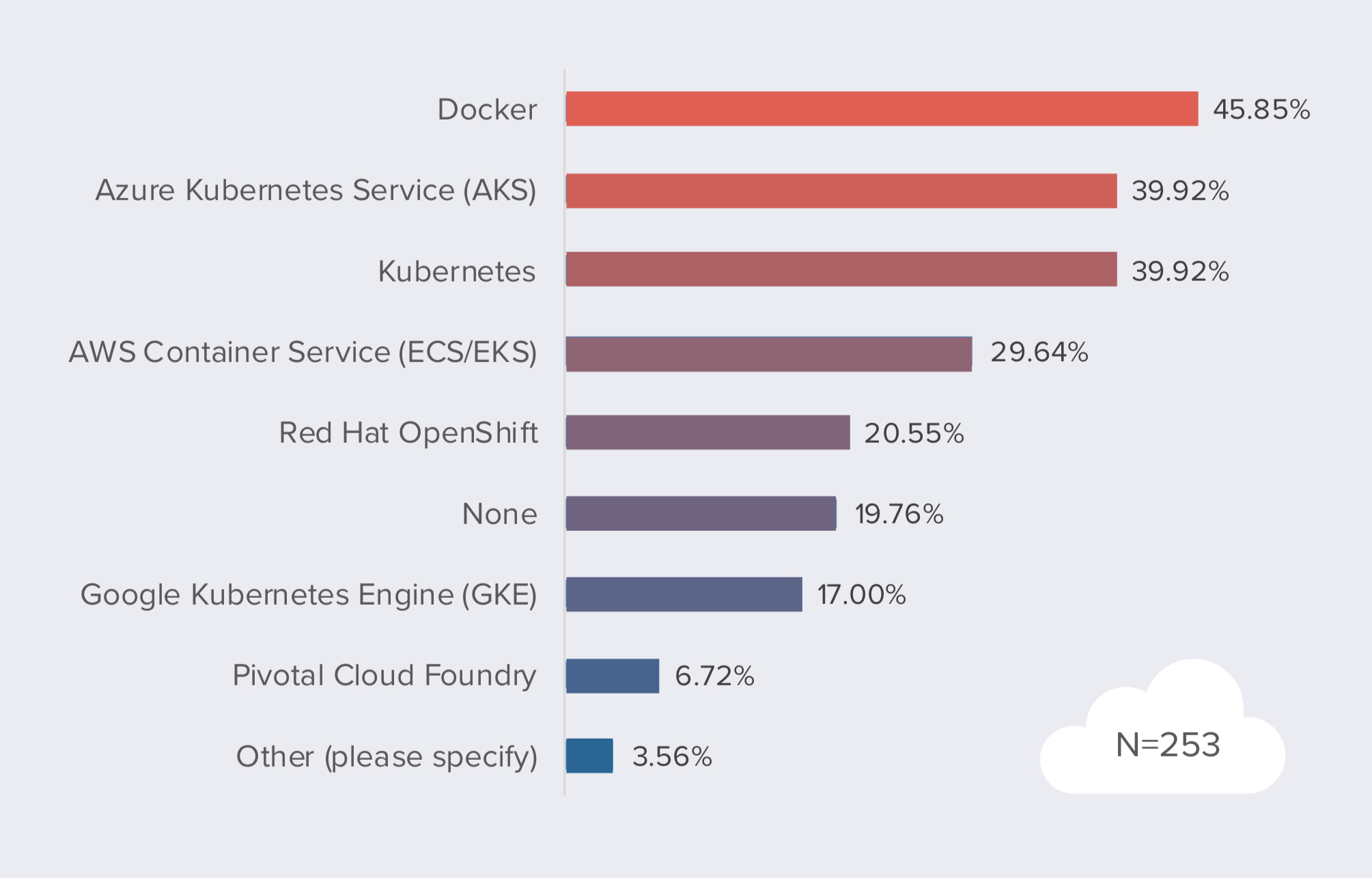
Customers can benefit from using containers in the cloud, as this can help with portability and scaling, simplifying the overall deployment process, and enhancing automation and simplicity.
As you can see in the diagram above, there are large differences in container adoption and popularity. More than two thirds of the respondents are leveraging some type of container implementation, with Docker leading the way, and close to 50% are taking advantage of it. Kubernetes is gaining steam, as is evident from the consistent support of all the key cloud providers.
As evidence that cloud adoption is accelerating, container use is growing by 50% year-over-year, thus becoming an important element of modern architecture.
5. Cloud Marketplaces and Cloud Programs
Cloud marketplaces are growing at a phenomenal speed, as every major tech company, distributor, and large SaaS provider is getting into the cloud marketplace game. Forrester predicts that the public cloud marketplace will reach $191 billion by 2020. With cloud marketplaces, users can access all the tools they need without having to pour out capital up front, enabling them to make the best of utility pricing, tight budgets, and balanced risk. Next we cover some of the top motivating factors, including some of the key cloud programs that are available via cloud marketplaces.
Chart 15
What are the top 3 motivating factors for cloud marketplaces?
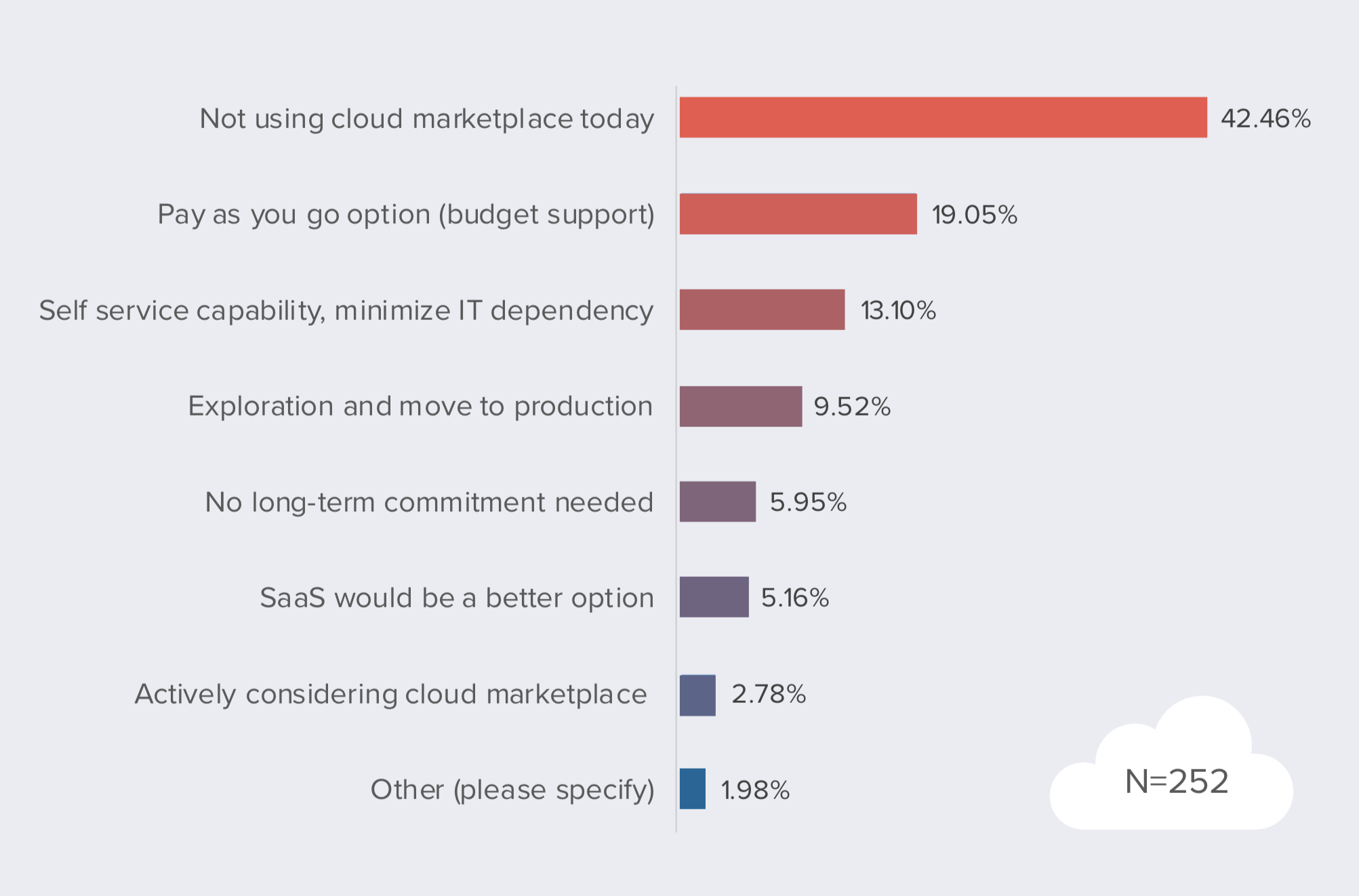
More than 50% of the respondents are leveraging cloud marketplaces for one reason or another, with utility pricing (pay as you go) being the most popular. Though the remaining 50% are not actively using it, they have given some thought to it, and might use it in the near future. The ability to not need a long-term commitment (6%) along with self-serviceability (13%), provide additional motivation for the cloud marketplace audience.
Chart 16
Marketplace Usage / Benefits, 2020 vs 2019
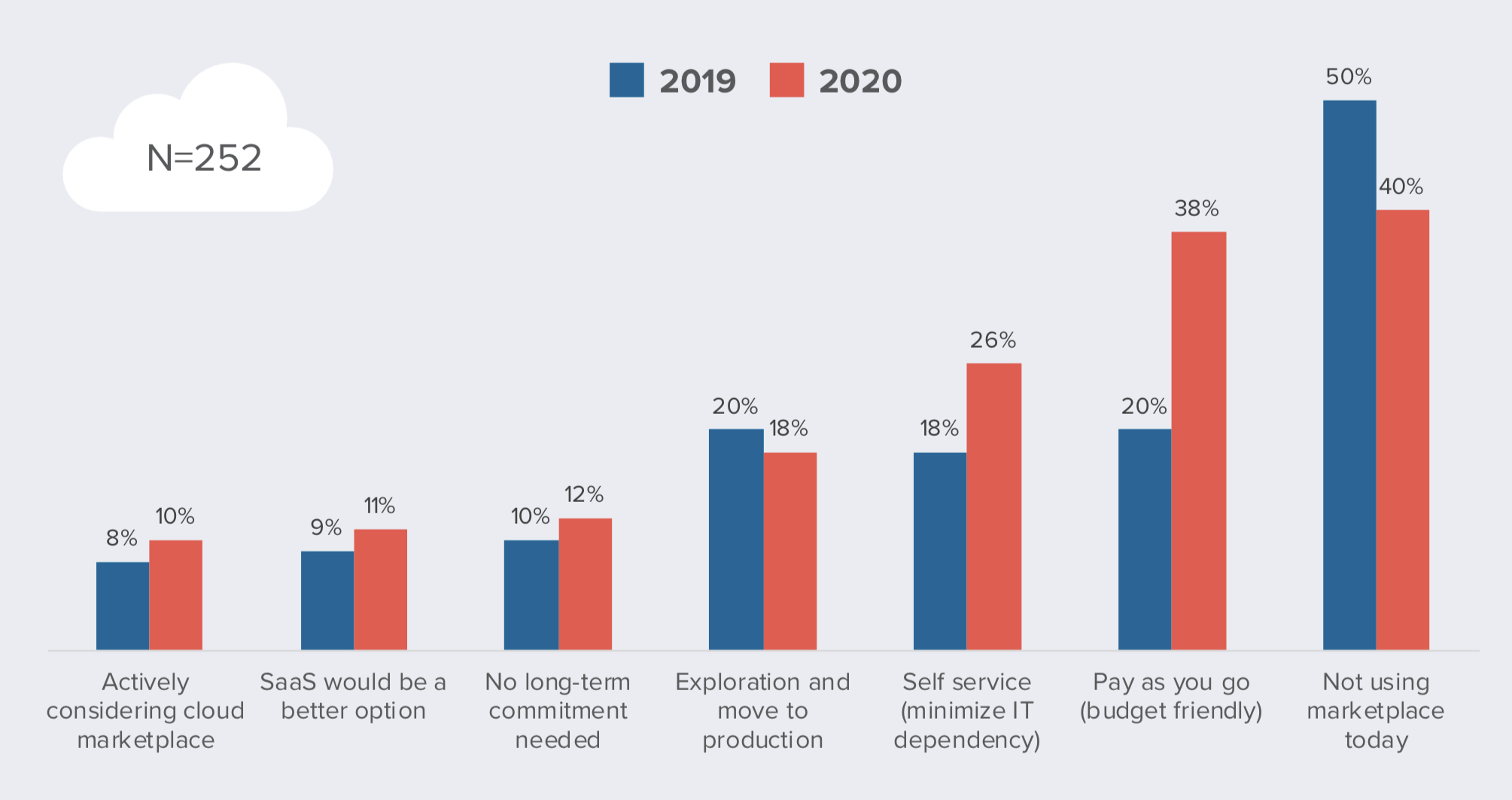
Comparing some of the numbers with 2019, cloud marketplaces are clearly growing quickly. They can be extremely useful when it comes to managing IT budgets, and they provide no-haggle transactions.
Chart 17
What are the key programs that drive cloud marketplace interest?

Cloud marketplaces offer a wide range of transaction and procurement programs and benefits that can often make them a deciding factor in the choice of a cloud platform. Close to 50% of the respondents see enterprise agreements as a great vehicle to alleviate the pains of legal processes and prolonged negotiations, along with enterprise discount programs (EDP) that can offer additional discounts. Private offers (20%) are becoming more common, with large enterprises leveraging pre-approved budgets via the Marketplace route.
In summary, cloud marketplaces change the dynamics of doing business, as they offer an agile platform for not only deployment but also procurement, which can flexibly match a variety of budgeting needs. The future evolution of the cloud marketplace will depend on how well ISVs can build their network of partners to spur innovation.
6. Data Management in the Cloud
As data’s center of gravity shifts to the cloud, hybrid cloud and multi-cloud architectures become the basis of data management and data flow. We saw earlier that various types of data (structured and unstructured) play a role in terms of integration and generation of advanced insights and thus data must be easily available in the cloud to boost agility and the ability to innovate, but easy accessibility must be balanced with protection to ensure maximum business value. The survey takes into account these two main considerations when evaluating a cloud solution.
Chart 18
Challenges when evaluating a cloud base solution?
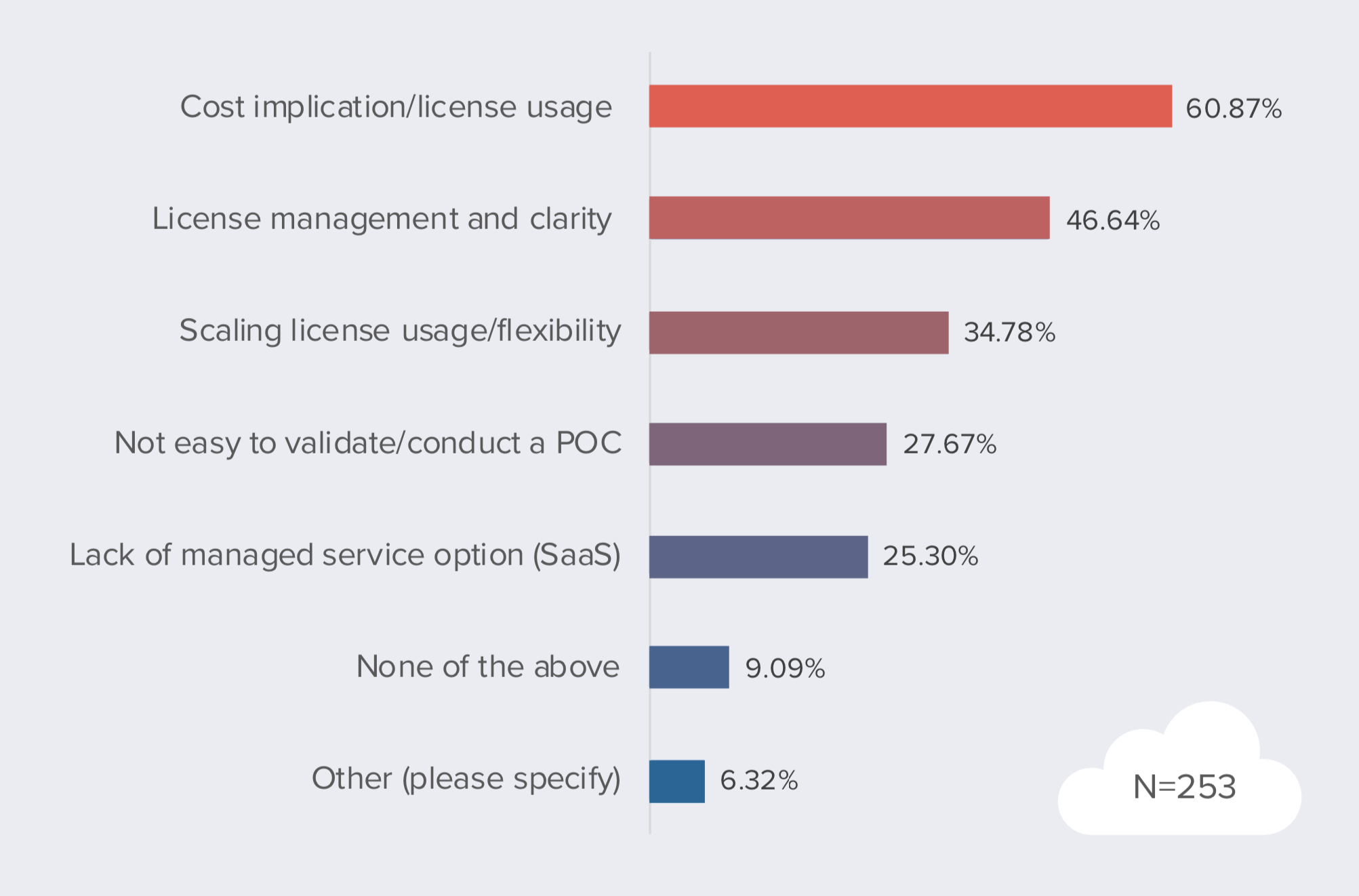
More than 60% of the respondents are concerned about the cost implication of software in the cloud, and this ties directly to license management capabilities and clarity. Another 30-40% of the respondents are not sure if they can easily validate the value of the cloud solution via a POC nor easily understand the impact of the workload scaling on license costs. One fourth of the respondents would prefer managed services (SaaS) for less dependency on IT or cloud-specific skills.
Chart 19
Overcoming challenges with data management/ integration in the cloud?

Now that we know some of the data management challenges that some organizations face when evaluating cloud solutions, It's good to remember that there are also ways to overcome these challenges. Virtual data lakes are one of the key solutions for getting a better handle on widespread data, and more than 50% of the surveyed organizations are investing in it. Cloud object storage also enables the central management of data but it lacks some key governance capabilities.
Another popular solution for integrating data in the cloud is data virtualization, chosen by 45% of the respondents, indicating that the Denodo Platform and other data virtualization solutions are making huge inroads, providing attractive TCO and security management.
Traditional approaches such as ETL and data warehousing are still in play, but they are not as versatile as competing approaches when it comes to data management in a multi-cloud environment.
Key Takeaways
Cloud technology continues to be one of the fundamental pillars of the modern workload. Organizations are looking at cloud solutions with a lot more confidence despite growing compliance and security concerns. The results of the Denodo Global Cloud Survey 2020 provides key insights, such as:
Hybrid and multi-cloud architecture accounts for more than 50% of the surveyed group’s deployment considerations and is the most popular form of deployment, while private cloud architecture is not going away anytime soon. Support for technologies such as AWS outposts, Azure Arc, and Google is the same as that for the previous year.
Cloud maturity is on the rise with 10% more users embarking on the cloud journey than last year. In addition, 78% of those surveyed are processing some meaningful cloud workloads, adding to the credibility of cloud adoption.
Once again, security- and governance-related challenges top the list, indicated by close to 70% of the respondents, while concerns around multi-cloud skills follow closely behind, emerging as the second biggest challenge.
For the first time in three years, since the Denodo Global Cloud Survey was first introduced, Microsoft
Azure is the top public cloud choice, and together with AWS, it now accounts for more than two-thirds of the market share.
Cloud marketplaces are becoming more popular not only because of utility pricing and self-serviceable options but also because of the variety of procurement and transaction options, such as private offers and enterprise contracts.
DevOps and containerization have become key components of cloud architecture and planning, due to organizations’ growing needs for automation and cost simplification using Kubernetes and other tools.
Data management and integration in the cloud is crucial to delivering real-time intelligence. Almost 50% of those surveyed are considering data virtualization as a key part of their modern architecture designs and
cloud migration strategies.
| METHODOLOGY
This study surveyed just over 250 organizations across 3 major global regions - North America, EMEA, and APAC. Users from various backgrounds and roles participated and shared their insights. The results from the Denodo Global Cloud Survey 2020 highlights where organizations are in their cloud adoption journeys. Surveys were fielded online in February 2020.
| DEMOGRAPHICS
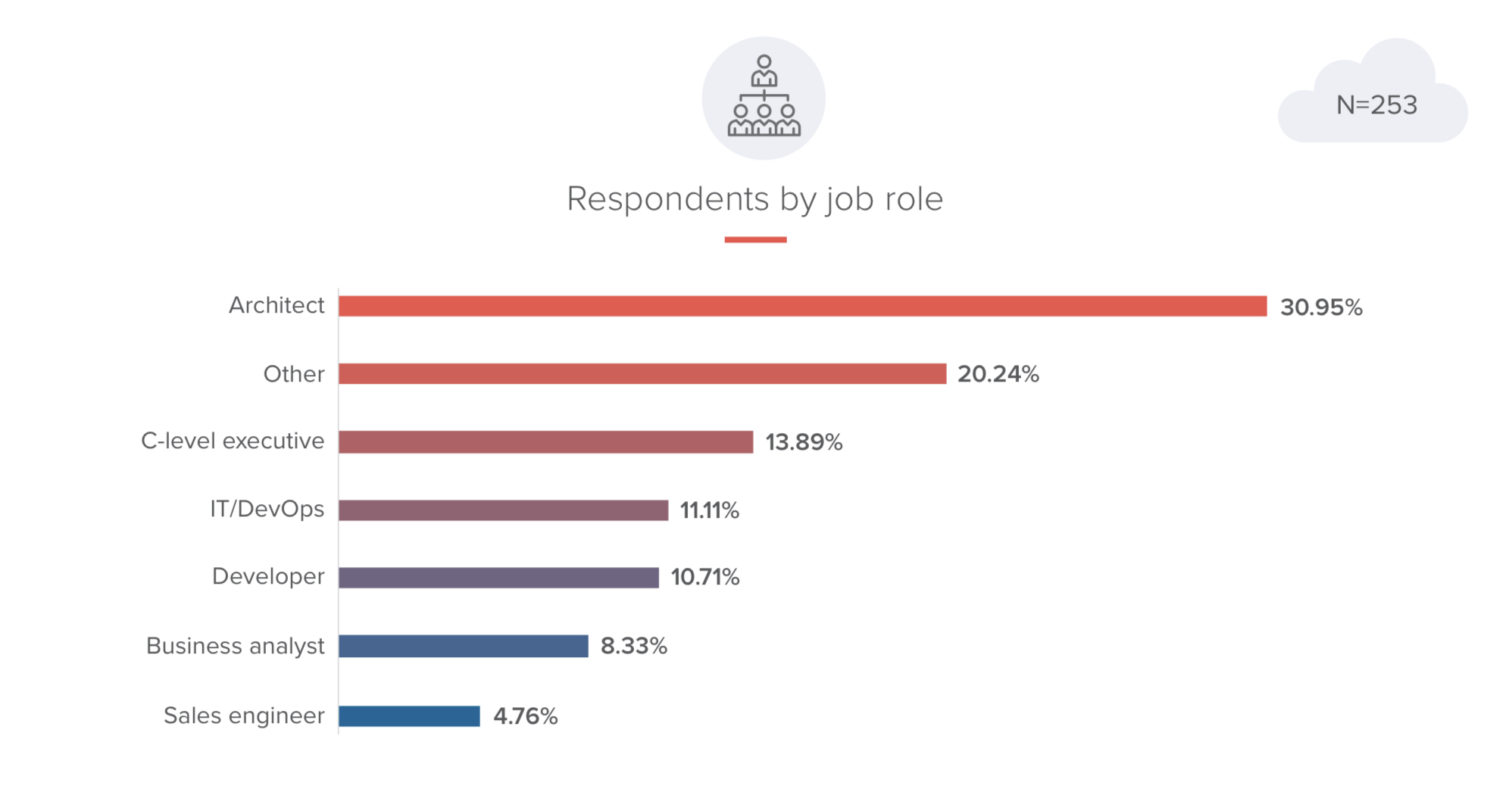
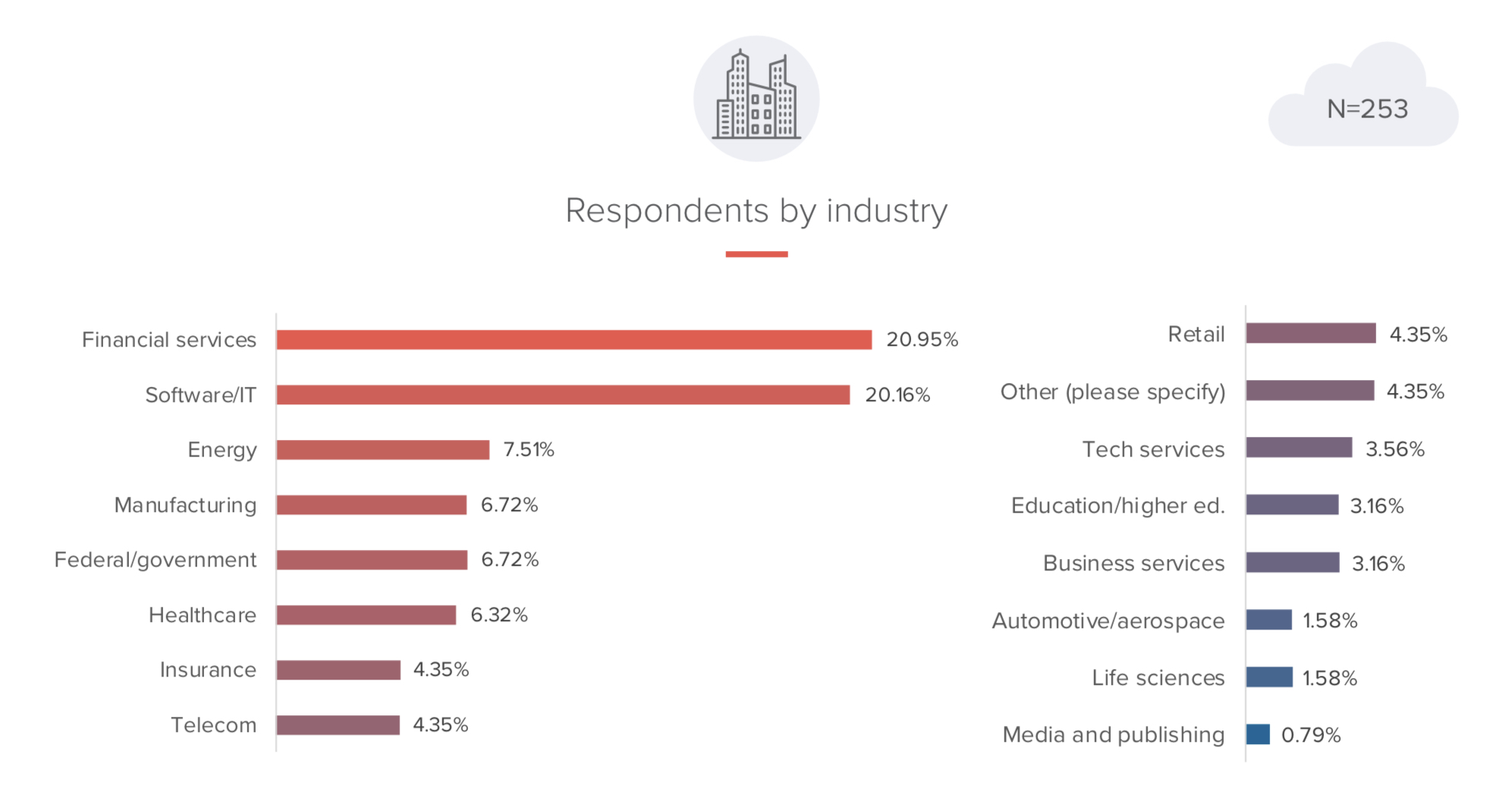
The Denodo Platform At-A-Glance
- The Denodo Platform provides all the benefits of data virtualization, including real-time access to integrated data across an organization’s diverse data sources, without replicating any data. The Denodo Platform offers the broadest access to structured and unstructured data residing in enterprise, big data, and cloud sources (Amazon Web Services, Microsoft Azure, and Google Cloud Platform), in both batch and real time, exceeding the performance needs of data-intensive organizations.
- The Denodo Platform makes multi-cloud integration a breeze with the help of its multi-location architecture. Users can deploy Denodo in a hybrid cloud ecosystem using BYOL (Bring Your Own License) and Cloud Marketplaces, making it easy for organizations to take advantage of data virtualization capabilities in the cloud. Explore the Denodo Platform via the various test drives and the 14 days free trial in the cloud.
- The Denodo Platform’s agile architecture enables a variety of use cases in the cloud such as data-as-a-service (DaaS) driving API integration, virtual data lakes, data warehouse modernization, and data science acceleration supported by built-in data catalog capabilities and more.
- The Denodo Platform can act as a central layer for cloud security, providing a single point through which to control access to all information. From managing role-based security to handling LDAP/ AD authentication, the Denodo Platform supports a variety of security protocols (such as SSL, OAuth) with which to connect to a wide variety of data sources while securely publishing data to consuming applications (using HTTPS or Kerberos). The Denodo Platform can also be used to comply with the GDPR.
- With over a hundred data source connectors (including those designed for structured and unstructured data sources), spread across different geographies, used by a variety of data consumers such as BI applications, data science tools, and web services, the Denodo Platform’s data virtualization techniques ease the inherent challenges of a hybrid cloud ecosystem.
Please check out the latest Denodo Cloud resources here.
Download a Personal
Copy of the Survey
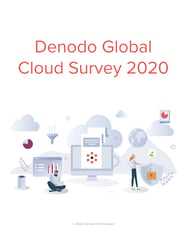
Fill out the form to receive
your copy of the eBook.
Download the Survey
KASH Tech: A Denodo Partner
As a Denodo Partner, KASH Tech is focused on modernizing your data integration strategy to meet the dynamic and evolving data needs of your organization, while meeting the demands of your diverse user communities.
To learn more about KASH Tech and how we can become your digital transformation partner who will deliver high-value results and ROI, download the eBook, "KASH Tech's Advanced Analytics Playbook."
